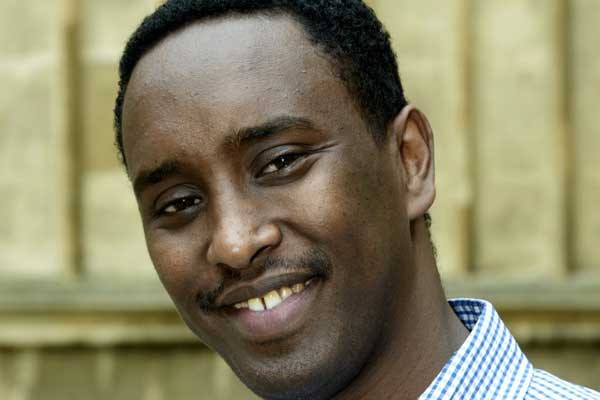
Sunday February 19, 2017

Abdul Adan, 30, may have seen his stories get international recognition only in 2009 but he first became a ‘published author’ when he was a child. While he was in primary school. PHOTO | COURTESY
Thirty-year-old Abdul Adan, who traces his roots to the divided border town of El Wak (it straddles both Kenya and Somalia), may have seen his stories get international recognition only in 2009 but he first became a ‘published author’ when he was a child. While he was in primary school, he wrote a short story about a time he walked for six hours with his uncle and cousin to the family’s camel encampment about 30km away from home.
“We got there at 9pm and set up a makeshift camp underneath a tree and my cousin and I slept. My uncle slept apprehensively because the area has hyenas and lions. He was also worried I would sleepwalk. A week later, after we were back in Elwak, my father said he had an intuition that we slept under a tree. He thought it would be a good to write about my first trip to badia (countryside),” says Adan.
His father paid a local with a big printer to publish the book, A Trip to the Countryside, about five years later when he was in high school. His cousin, Ibrahim Adan, who had a degree in literature edited it and his father sold this book from the counter of his general hardware shop.
In 2006, Adan immigrated to the US and worked as a taxi driver in Chicago. His first officially published short story was Old Ibren which was published by African Writing magazine in March 2010. It talks about a man who writes a letter to his son in a land beset by tribal conflict but who turns out he might already have died the day before he writes the letter.
Adan had come to Kenya in 2009 to work on his short stories and wrote seven in total. Towards the end of 2010, Billy Kahora from Kwani? published A Bag of Oranges. His other story written at the time, We Can See You, has been chosen to make up an anthology of the best stories by Storytime magazine that will come out later this year, although it also featured similarly in 2012.
BREASTFED TWICE
In 2014, The Somalification of James, a story about a Kikuyu man who wants to marry a Somali girl but first has to overcome hurdles placed by her family, was submitted to the Caine Prize for African Literature but it just missed out on the shortlist. It did, however, receive a high commendation from the judges.
“I received a letter praising my story. As a result, I got invited to the Caine Prize workshop in Zimbabwe. They flew me from the States, where I took a two-week break from my degree in literature. I fell behind on the workshop, so I based The Lifebloom Gift on a fictional case study I had done for one of my courses. It is a story about a man who cannot believe in what he can’t feel,” says Adan.
The story had bits of his own life. At seven months old, he had already been taken off breastfeeding because his mother was pregnant again. She then miscarried after getting shock she had when bandits broke in to their home. He was made to breastfeed again but found himself at six years still sucking on his tongue and other things because of the months he had missed out on.
The story was published in The Gonjon Pin and Other Stories: The Caine Prize for African Writing 2014. He was informed through an email letter in late 2015 that the story had made the Caine Prize shortlist for 2016, while on a break in Kenya. He had been in Kazakhstan for a year and a half then, teaching English. He hadn’t read or written anything in English besides his instructional books.
In 2016, he decided to submit a proposal of a novel he intended to write to Miles Morland Foundation for a writing scholarship.
“You send an excerpt of something that’s already been published and offered for sale, together with a biography and document to show you were born in Africa. I didn’t know how to write a proposal so I wrote a synopsis of the novel. I told them the novel will largely rely on revelation and insight, rather than suspense.”
To his surprise, Adan won the scholarship that year. The scholarship is worth Sh1.8 million spread over a year and he has to put together 10, 000 words each month to get a monthly cheque.
“The novel will revolve around the narrator who has been deported from the US and leaves in the border town of El WaK. He suffers from an obsession of analysing people. They include a girl from Seattle whom he thinks is too airy and forgettable, a dead poet from Kazakhstan whose suicide note the narrator comes across in a journal, and a radical-extremist who applies lubricants on his hostages before executing them.”
“I’ve never really worked on this form of telling a single story in 300 pages. Before starting the first word I would know how long the story would be, and even how many for each section. The novel’s beginning will actually be from the middle of the story,” says Adan.